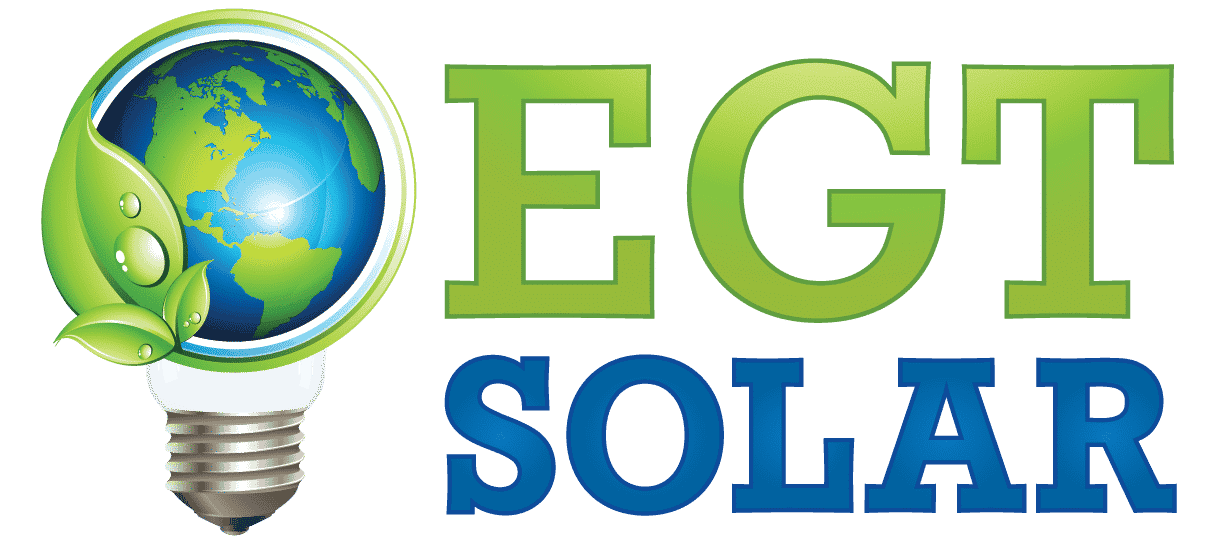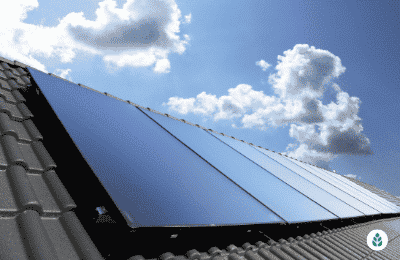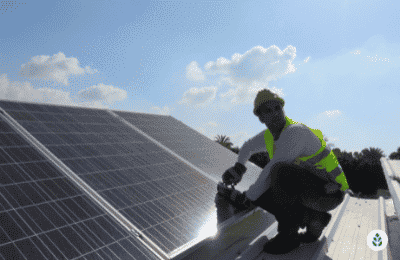
Is Solar Worth It in Idaho? (2024 Homeowner's Guide)
Here’s a quick overview of solar viability in Idaho:
- Idaho ranks 29th in the country for solar installations.*
- The average electricity rate is 11.82 cents per kilowatt-hour.**
- The average solar payback period is 14 years.***
- Homeowners are eligible for the Residential Alternative Energy Tax Deduction and the federal solar investment tax credit (ITC).
- The average homeowner saves $17,308 over the lifetime of their solar system.***
*According to the Solar Energy Industries Association.1
**Data from the Energy Information Administration.2
***Calculated assuming the system is purchased in cash.
Each product and or company featured here has been independently selected by the writer. You can learn more about our review methodology here. If you make a purchase using the links included, we may earn commission.
Idaho homeowners enjoy an incredibly low electricity rate — one of the lowest in the nation — and use just above the average amount of electricity as homeowners throughout the country. As such, many residents are left wondering if investing in solar panels is worth it. Generally speaking, the answer is yes, but there are quite a few factors you need to consider to figure out if solar conversion is right for your home. Below, we’ll be discussing how you can determine if solar panel installation is right for you. We’ll also include some information on why solar conversion is beneficial in Idaho and some things to understand before you switch to this clean energy source.
To speak with an EcoWatch-vetted professional who can help you determine whether solar is worth it for your Idaho home, follow the links below.

Blue Raven Solar
Pros
- Industry-leading in-house financing
- Competitive pricing
- Excellent reputation
Cons
- Doesn't offer solar batteries (coming 2022)

EGT Solar

Local Service
Average cost
Pros
- Representatives are experts on local policies
- Outstanding customer service
- Offers products from leading manufacturers
Cons
- Limited information available on website
- Slightly limited service offerings
- No leases or PPAs

Blue Raven Solar
Pros
- Industry-leading in-house financing
- Competitive pricing
- Excellent reputation
Cons
- Doesn't offer solar batteries (coming 2022)
Watch Below: Learn How Solar Energy Has Gotten So Cheap
How to Figure Out if Solar Panels are Worth It in Idaho
Solar is a worthwhile investment for most homeowners in Idaho, but it’s not an ideal solution for everyone. We’ll provide some insight into the factors that affect how good of a candidate your home is for solar panel installation.
What’s Your Home Electricity Consumption?
Solar panels are generally good investments for homes that consume more than 500 kilowatt-hours of electricity per month. Households that have higher energy needs — or high energy rates — will benefit more. You can check your electricity usage on your past energy bills, which typically include an average consumption over the past 6 to 12 months. Most homeowners in Idaho use an average of 955 kWh, which is above the national average of 881 and is well above the cutoff where panels are considered worthwhile. As such, most Idahoans will find that solar is a good investment from a consumption point of view.
How Much Is It To Go Solar in Idaho?
The price of solar panels in Idaho will vary among solar customers, as it’s based on several factors. The average total, assuming the typical system size of 10 kilowatts is around $32,600 or $22,820 after the federal tax credit is considered. Your system will generally be priced based on size, with an average per-watt price of $3.26 — which is less than the national average of $3.33.
Solar panels pay themselves off more quickly and provide more energy savings in areas where electricity rates are high or energy needs are well above average. Since neither of these criteria applies to Idaho, solar is less valuable in the Gem State than in most other areas. Still, many homeowners in Idaho find solar to be a good financial investment.
What’s the Payback Period for Solar in Idaho?
Most home solar systems will pay for themselves in energy rates over the years. The timeline for this process is called the solar panel payback period. Most Idaho solar systems pay for themselves in about 14 years, which is well above the national average of 12 years. The majority of Idahoans break even on their solar arrays in 11 to 17 years, making it one of the slower states for panel repayment.
You can contact a solar installer to estimate your solar payback period or use a solar calculator online. If your timeline is longer than 19 years, you’ll still likely save money in the long run. However, the longer the payback period, the lower your return on investment. You will not be expected to save any money if your payback period is beyond 25 years.
What Are Average Buy-Back Rates in Idaho?

How Much Sun Does Your Roof Receive?
Solar panels are more valuable on homes with roofs that face the sun and where sunlight is intense and abundant. You’ll want to consider the direction your roof faces — south is best, and west is second-best — as well as any shading from trees or buildings on your property that could impede your available sunlight.
Generally speaking, Idaho is a good area for solar panels in terms of available sunlight if your roof faces the south and you don’t have heavy shading on your home. The state receives an average of 206 sunny days a year, which is just over the national average of 205.
What’s the Outlook on Solar in Idaho?
Solar is less popular in Idaho than in most states, but the market is expanding and is expected to continue to do so. Residential solar installations have increased year over year for the past decade, and commercial solar installations are becoming a bit more prevalent as well.
Wind power has a stronger foothold in Idaho right now, which is largely why solar adoption has been relatively slow. With that being said, Idaho is a fairly solar-friendly state, offering one of the best statewide solar tax incentives in the country. The lack of net metering is a downside of wind power being so prevalent, but it’s not a make-or-break issue for most homeowners.
Benefits of Solar Energy in Idaho
Installing solar panels comes with a slew of benefits that some homeowners might not even be aware of. We’ll discuss the most prevalent upsides to going solar in Idaho below.
Electricity Bill Savings
One benefit that most homeowners do know about is the savings solar panels can provide on electric bills. In fact, this is where most of the value of solar installation comes from. The average Idahoan spends around $112.88 per month on their energy bills, so annual savings could be as high as $1,354 after going solar. Once your solar power system pays for itself in energy savings, it’s expected to save an additional $17,308 in Idaho, on average. Your savings might end up being even higher, as electricity rates have historically risen and might continue to do so going forward. Installing solar panels means you essentially lock in a lower energy rate and avoid the price hikes.
Lower Taxes & Access to Other Incentives
The State of Idaho and the federal government provide several incentives for residents to convert to solar power. One of the most significant incentives is the federal tax credit (ITC), which gets credited to your federal income tax liability for the year your system is installed and commissioned. The ITC is for 30% of your total installation expense to go solar, which, in Idaho, averages out to $9,780.
Despite the lack of a net metering policy, there are some excellent solar incentives in Idaho:
- Residential Alternative Energy Tax Deduction: This is a state tax credit that provides a credit to your state income taxes for 40% of your entire system expense for the first year and then 20% per year for three additional years. Each year’s credit is capped at $5,000, and the total four-year credit is capped at $20,000. This is one of the best state incentives in the entire country.
- Low-Interest State Energy Loans: Idaho also provides accessible and affordable energy loans that can be used for solar equipment. The interest rates are capped at just 4%.
Home Resale Value Increase
One benefit of going solar that many homeowners aren’t aware of is that panels bump up your property value. According to estimates from Zillow, when you install solar panels on your home, your property value is expected to jump up by around 4.1%, on average.3 In Idaho, where the average home is valued at $434,224, the typical increase in value will be a massive $17,803! This dollar amount could be even higher in most expensive areas, like Boise, Idaho Falls and Twin Falls. It’s important to note that this value increase is only expected if you use a cash purchase or a solar loan to acquire your panels. Solar leases and power purchase agreements will not increase your home value and can even make your property less appealing to buyers.
Clean, Renewable Energy
Some Idaho homeowners who are more concerned with benefiting the environment than saving money will also be pleased to know that going solar is quite the eco-friendly home improvement. Installing solar panels will reduce your dependence on fossil fuels, meaning you’ll contribute less to air and water pollution and reduce your contribution to global warming. You’ll also be less reliant on your electric company, which means you can avoid the expected energy price hikes in the future.
What to Look Out For When Considering Solar in Idaho
Determining that your home is a good fit for solar is a great first step to take, but there are quite a few things you should understand to ensure that the entire process of installing solar panels on your home is a positive one. We’ll discuss some additional things you should consider before converting your home below.
Upfront Fees

Payback Period
Your estimated solar panel payback period is one of the best metrics for determining if solar is right for your home because it tells you how long it will take your panels to recuperate the total solar energy system expense. If your payback period is longer than 19 years — which is the upper average payback time in Idaho — your overall savings will be lower than average. If your payback period is longer than 25 years, there’s a chance your panels won’t save money in the long run.
Net Metering Policies in Idaho
Net metering provides solar customers a good opportunity to eliminate their electric bills. Unfortunately, net metering is not mandated in Idaho, so many customers won’t have access to the program. However, some electric companies offer it privately to their customers. Policies can vary a bit between utility companies, so you should check with your provider before signing anything. If you don’t have net metering, you might want to install a solar battery to offset your electric bills. This will add to your solar panel system expense but could be worth the investment over time.
Pending Policies & Changes to Incentives
The solar industry is expanding and improving every year, so policies and incentives are always subject to change. Net metering programs, incentives and rebates could pop up in the future, while others could change or disappear entirely. It’s not usually a good idea to wait for better incentives to come along, but you should know what incentives are available to you before you convert.
Weather & Climate in Idaho
Solar panels are best in areas with direct, intense and abundant sunlight, meaning they’re a better fit for homes closer to the equator. However, northern states like Idaho can also benefit greatly, especially since the state receives 206 sunny days a year, right around the national average and usually plenty to provide sufficient power to make the panels worth the investment. Some prospective solar customers worry about the cold winters reducing efficiency, the cloudy days in the state and the chance of extreme weather. Electricity travels more rapidly in the cold, so the frigid winters in Idaho can still provide decent efficiency for your solar array. Cloudy days will reduce panel efficiency, but there’s typically enough sun overall to offset the dip in efficiency. Extreme weather like intense thunderstorms and tornadoes could pose a threat to your panels, but getting a system with a good warranty should allay any concern.
Companies Pushing Solar Leases or PPAs
Finally, you need to be aware that not every solar company out there is a good option, as there are some that are just out for profit and don’t have your best interests in mind. Specifically, companies that advertise “free panels” — which aren’t really free — and those that promote solar leases and power purchase agreements (PPAs) aren’t usually a good option. Solar leases are far less appealing than solar loans, as they provide less or no ROI and prevent you from enjoying several solar benefits, including increased home value and the federal solar tax credit.
Unfortunately, there are companies that are even more nefarious and are just looking to scam you. Idaho Power put out a notice to customers that there are solar installers going around claiming to be affiliated with them but aren’t.4 The Attorney General in Idaho also warned residents about solar scams that often involve inflated promises of savings and free solar panels.5 Make sure you only work with a vetted and reputable company to avoid falling victim to one of these scams.
Wrap Up: Is Solar Worth it in Idaho?
Generally speaking, going solar is worth the investment in Idaho for most homeowners, and it will end up saving most residents a substantial amount of money over time, even after the system pays for itself. However, it’s definitely not right for everyone, so you need to figure out if installing solar panels is a good option for your home. You’ll want to consider your monthly energy bills, how much sunlight your roof gets, shading on your property, your estimated solar panel payback period, your financing options, and more before committing to solar conversion. We strongly recommend getting in touch with a reputable solar installer in your area to help you figure out if solar is likely to save you money.
See also: See how much you can save by going solar with the EcoWatch Solar Calculator
Read More About Going Solar
- What Are the Best Solar Companies in Idaho?
- What Solar Incentives Are Available to Idahoans?
- Find Cost Savings on Solar in Idaho
The cost information presented in this article is derived from a comprehensive analysis, incorporating data from multiple industry sources. The average cost per watt per state was calculated based on figures from Consumer Affairs, Energy Sage, and Berkeley Lab’s Electricity Markets & Policy Department. Additionally, monthly energy consumption and the average monthly cost of electricity were sourced from the U.S. Energy Information Administration, ensuring a well-rounded and accurate representation of the information presented.
Frequently Asked Questions
The EcoWatch team gets lots of questions from Idaho residents about the viability of solar for their properties and how to figure out if it’s worth it. Below are some of the questions we see most frequently, along with our responses. If you have specific questions that aren’t answered here, reach out to our team of solar experts at solar@ecowatch.com.
The answer to this question depends on quite a few factors. Generally speaking, Idahoans pay off their solar systems with the energy savings they provide in 14 years, on average, with most payoffs occurring between 11 and 17 years. If your roof faces south and gets unimpeded sunlight, your average will likely be lower. Other factors that can shorten your payoff time include above-average energy consumption, a smaller system size requirement, good home energy efficiency, and more.
While it’s not guaranteed, installing solar typically does save homeowners in Idaho money. Solar panels reduce your power bills, and those savings add up to pay off your system in an average of 14 years in the area. After that time, the remaining 11+ years of system life can provide you with actual savings. The average Idaho resident saves $17,308 by going solar, and that’s after the panels pay themselves off.
Yes! As long as you acquire your solar panels with a solar loan or cash purchase, your solar panels will cause your property value to increase. Estimates from Zillow suggest that the home value will jump by around 4.1%, meaning the average property in Idaho will go up in value by approximately $17,803.
Yes, permits are required to install solar panels in Idaho. Permits ensure that your home is structurally sound enough to support the added weight of solar panels and that the electrical work is done safely. In most cases, your solar installer will handle the permitting process for you, so you’ll never have to deal with your permitting agency.
It is possible to DIY some of the solar panel installations, but it’s not recommended. Installing a rooftop solar system is inherently dangerous, and you’ll be putting yourself, your property, and your expensive solar equipment at risk if you attempt to install the panels yourself. We strongly recommend paying the minimal labor fees and letting a professional installer tackle the project for you from start to finish.
Top Solar Installers in Idaho Cities
Comparing authorized solar partners
-
- Industry-leading in-house financing
- Competitive pricing
- Excellent reputation
- Doesn't offer solar batteries (coming 2022)
A+Best Solar Financing2014Trina Solar, Canadian Solar, SolarEdge, Silfab, SunPower25-year manufacturer warranty; 10-year workmanship warranty, 2-year production guarantee
Having trouble deciding? Click below and use our process to receive multiple quotes instead:

 233k
233k  41k
41k  Subscribe
Subscribe 




